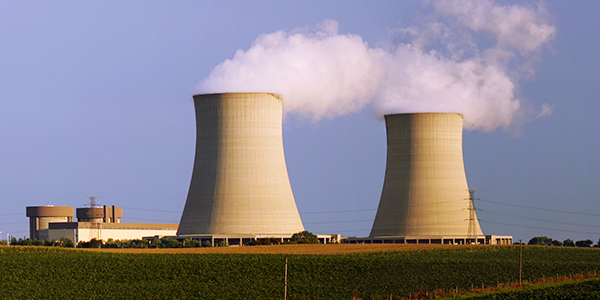By Michael Kuser
Several power producers joined the Electric Power Supply Association on Monday in petitioning the U.S. Supreme Court to review appellate court rulings upholding the New York and Illinois zero-emission credit programs.
Last September, both the 2nd and 7th U.S. Circuit Courts of Appeals rejected claims by EPSA and others that New York’s and Illinois’ ZECs, respectively, intrude on FERC jurisdiction. (See Appeals Court Upholds NY Nuclear Subsidies and 7th Circuit Upholds Ill. ZEC Program.)
EPSA on Jan. 7 petitioned the Supreme Court for writs of certiorari to review both decisions. The group was joined on the 2nd Circuit petition by NRG Energy, with the New York Public Service Commission and Exelon — and its three New York nuclear plants — named as defendants. Calpine joined the 7th Circuit petition in the case against the Illinois Power Agency, the Illinois Commerce Commission and Exelon.

Exelon’s Byron Generating Station’s two nuclear reactors in Illinois produce more than 2,300 MW of electricity.
Enough Percolation
The New York PSC created the ZEC program in August 2016 as part of its Clean Energy Standard, which set a goal of reducing greenhouse gas emissions by 40% by 2030.
The PSC said it designed the program to avoid the issues behind the Supreme Court’s April 2016 ruling in Hughes v. Talen, which voided Maryland regulators’ contract with a natural gas plant as an intrusion into federal jurisdiction over wholesale power markets. (See NY Attempts to Thread Legal Needle with Clean Energy Standard, Nuke Incentives.)
The 2nd Circuit said that ZECs, like renewable energy credits, are certifications of an energy attribute separate from the purchase or sale of wholesale energy. Although the ZEC program “exerts downward pressure on wholesale electricity rates, that incidental effect is insufficient to state a claim for field pre-emption under the” Federal Power Act.
The court noted that the PSC avoided the defects of the Maryland contract for differences, which required the generator to participate in PJM’s capacity market.
But EPSA attacked ZECs from a different angle in its petitions.
“The question presented is whether the FPA pre-empts only state subsidies that explicitly require a wholesale generator to sell its output in FERC-approved auctions, or whether the FPA also pre-empts state subsidies that lack such an express requirement but that, by design, subsidize only generators that sell their entire output via such auctions, thereby achieving the same effect,” both petitions said.
“This is not a situation in which further percolation in the courts of appeals is warranted. Indeed, delay risks long-term distortion of the energy markets,” the petitioners said. “The programs already in place are causing multibillion-dollar distortions and skewing decisions about long-term investment in energy generation.”
In addition, the petition on the Illinois ruling said the 7th Circuit’s “decision also rests on an erroneous understanding of the structure and operation of the Illinois ZEC program,” and that while “these factual and procedural errors were addressed in a rehearing petition, the court took no corrective action.”

U.S. Supreme Court
Old Wine in New Bottles
Ari Peskoe, director of the Electricity Law Initiative at Harvard Law School, said, “These arguments about the text of the FPA and the court’s 2016 Hughes decision largely repeat the generators’ briefs filed at the 2nd and 7th Circuits. In rejecting these arguments, the 2nd Circuit panel found it ‘telling that [the generators] cannot persuasively explain why FERC’s holding [disclaiming jurisdiction over RECs] does not apply equally to ZECs.’”
Peskoe pointed out that amicus briefs filed at the appellate courts explain that “a decision endorsing petitioners’ sweeping view of FERC’s authority over all payments received by generators would threaten existing renewable energy programs and deny FERC the opportunity to harmonize its market regulation with state programs.”
The 7th Circuit’s opinion cited the Hughes ruling, in which the Supreme Court said it did not intend “to foreclose [states] from encouraging production of new or clean generation through measures ‘untethered to a generator’s wholesale market participation.’”
“And that’s what Illinois has done,” the 7th Circuit said. “To receive a credit, a firm must generate power, but how it sells that power is up to it. It can sell the power in an interstate auction but need not do so. It may choose instead to sell power through bilateral contracts with users (such as industrial plants) or local distribution companies that transmit the power to residences.”
EPSA had contended that Illinois’ ZEC program infringed on FERC’s jurisdiction by indirectly regulating interstate energy markets by using average auction prices as a component in a formula that affects the cost of the ZECs. But the 7th Circuit found the value of ZECs does not depend on the generators’ auction offers.



